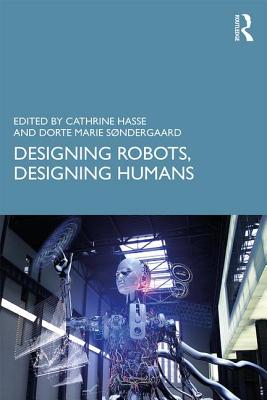Cognitive Robotics
暫譯: 認知機器人學
Samani, Hooman
- 出版商: CRC
- 出版日期: 2020-06-30
- 售價: $2,360
- 貴賓價: 9.5 折 $2,242
- 語言: 英文
- 頁數: 230
- 裝訂: Quality Paper - also called trade paper
- ISBN: 0367575469
- ISBN-13: 9780367575465
-
相關分類:
機器人製作 Robots
-
其他版本:
Cognitive Robotics (Hardcover)
相關主題
商品描述
The kimono-clad android robot that recently made its debut as the new greeter at the entrance of Tokyo's Mitsukoshi department store is just one example of the rapid advancements being made in the field of robotics.
Cognitive robotics is an approach to creating artificial intelligence in robots by enabling them to learn from and respond to real-world situations, as opposed to pre-programming the robot with specific responses to every conceivable stimulus.
Presenting the contributions of international experts from various disciplines within the field, Cognitive Robotics provides novel material and discusses advanced approaches in the field of intelligent robotics. It explains the various aspects of the topic to provide readers with a solid foundation on the subject.
This edited collection presents theoretical research in cognitive robotics. It takes a multidisciplinary approach that considers the artificial intelligence, physical, chemical, philosophical, psychological, social, cultural, and ethical aspects of this rapidly emerging field. The editor is a prominent researcher whose Lovotics research into emotional bonds with robots is widely recognized.
Supplying an accessible introduction to cognitive robotics, the book considers computational intelligence for cognitive robotics based on informationally structured space. It examines how people respond to robots and what makes robots psychologically appealing to humans.
The book contextualizes concepts in the history of studies on intelligence theories and includes case studies of different types of robots in action. Although ideal for robotics researchers and professionals, this book is also suitable for use as a supporting textbook in advanced robotics courses at both the undergraduate and graduate levels.
商品描述(中文翻譯)
最近在東京三越百貨公司入口處首次亮相的穿著和服的安卓機器人,僅僅是機器人技術快速進步的一個例子。
認知機器人學是一種創造機器人人工智慧的方法,通過使機器人能夠從現實世界的情況中學習和反應,而不是將機器人預先編程為對每一種可想像的刺激做出特定反應。
《認知機器人學》展示了來自各個學科的國際專家的貢獻,提供新穎的材料並討論智能機器人領域的先進方法。它解釋了該主題的各個方面,為讀者提供了堅實的基礎。
這本編輯集呈現了認知機器人學的理論研究。它採取多學科的方法,考慮到這一快速新興領域的人工智慧、物理、化學、哲學、心理學、社會、文化和倫理等方面。編輯是一位著名的研究者,其在機器人情感聯結方面的Lovotics研究廣受認可。
本書提供了對認知機器人學的易懂介紹,考慮了基於信息結構空間的認知機器人的計算智能。它探討了人們如何對機器人做出反應,以及什麼使機器人在心理上對人類具有吸引力。
本書將概念置於智能理論研究的歷史背景中,並包括不同類型機器人運作的案例研究。雖然本書非常適合機器人研究人員和專業人士,但也適合作為本科和研究生高級機器人課程的輔助教材。
作者簡介
Hooman Samani is director of the Artificial Intelligence and Robotics Technology Laboratory (AIART Lab) and an assistant professor at the Department of Electrical Engineering, College of Electrical Engineering and Computer Science, National Taipei University, Taiwan.
His career in robotics and artificial intelligence research has spanned many countries including Taiwan, Singapore, Japan, United Kingdom, Germany, the Netherlands, and Iran. He was awarded a PhD from the Graduate School for Integrative Science and Engineering, Electrical & Computer Engineering Department, National University of Singapore. After obtaining his PhD, he became a Research Fellow at the Keio-NUS CUTE Center, which is a collaborative research center with locations in both the National University of Singapore (NUS) and Keio University in Japan.
His proposed research topic is Lovotics, which involves multidisciplinary research in artificial intelligence for human-robot affective relationships. This research comprises several topics including robotics, engineering, computer science, interaction design, philosophy, psychology, mathematics, computational neuroscience, art, and computational intelligence, for developing a truly interactive robot with pragmatic affection. Lovotics robots, Kissenger, Mini-Surrogate, and XOXO are some novel applications of Lovotics research.
作者簡介(中文翻譯)
Hooman Samani 是國立台北大學電機工程學院電機工程系的人工智慧與機器人技術實驗室 (AIART Lab) 的主任及助理教授。
他的機器人與人工智慧研究生涯遍及多個國家,包括台灣、新加坡、日本、英國、德國、荷蘭和伊朗。他在新加坡國立大學的整合科學與工程研究所獲得博士學位,專攻電機與計算機工程。獲得博士學位後,他成為慶應大學與新加坡國立大學 (Keio-NUS) CUTE 中心的研究員,該中心是位於新加坡國立大學和日本慶應大學的合作研究中心。
他提出的研究主題是 Lovotics,這是一個涉及人工智慧在人體與機器人情感關係中的多學科研究。這項研究涵蓋多個主題,包括機器人學、工程學、計算機科學、互動設計、哲學、心理學、數學、計算神經科學、藝術和計算智能,旨在開發一種具有實用情感的真正互動機器人。Lovotics 機器人,如 Kissenger、Mini-Surrogate 和 XOXO,是 Lovotics 研究的一些新穎應用。














